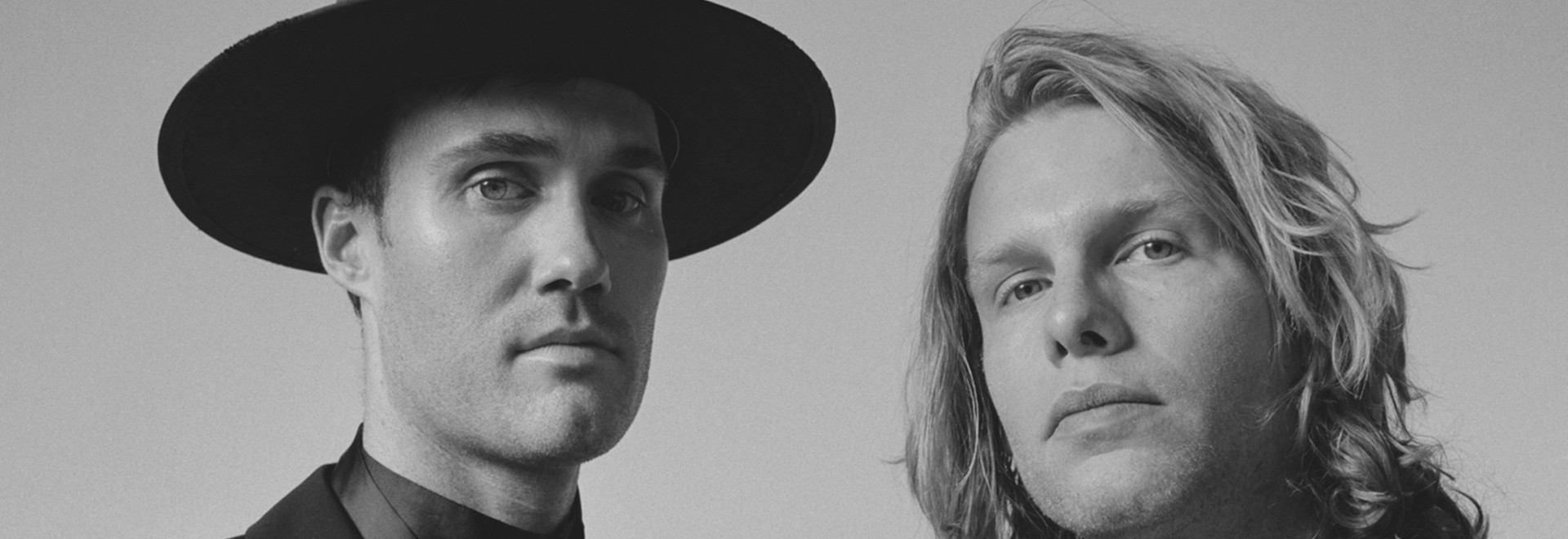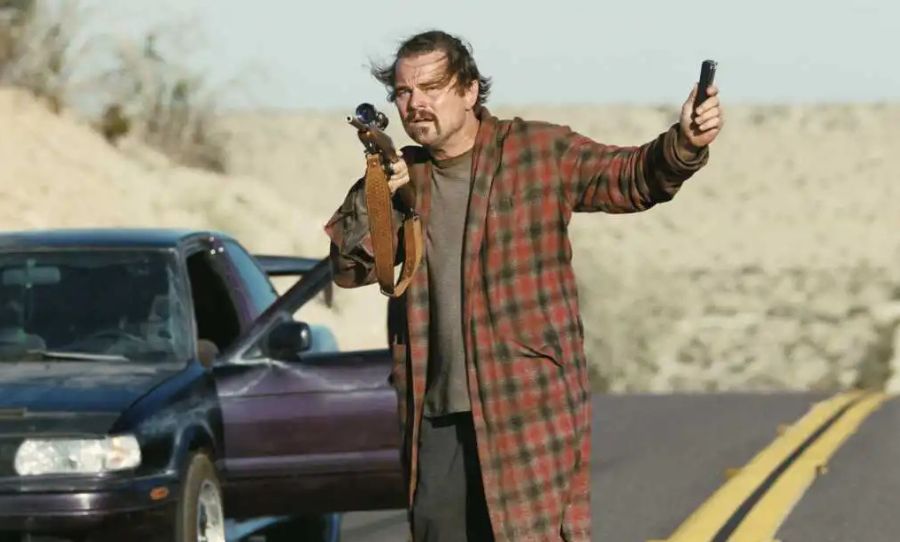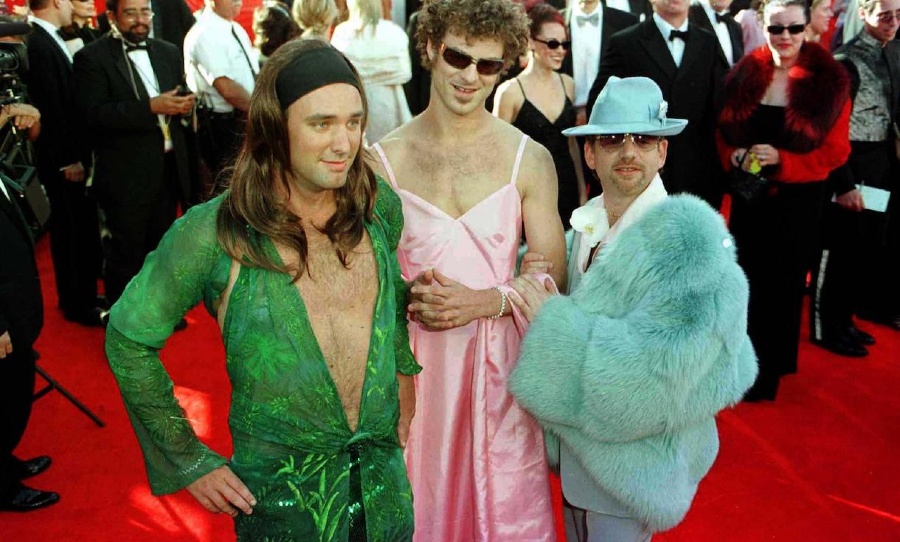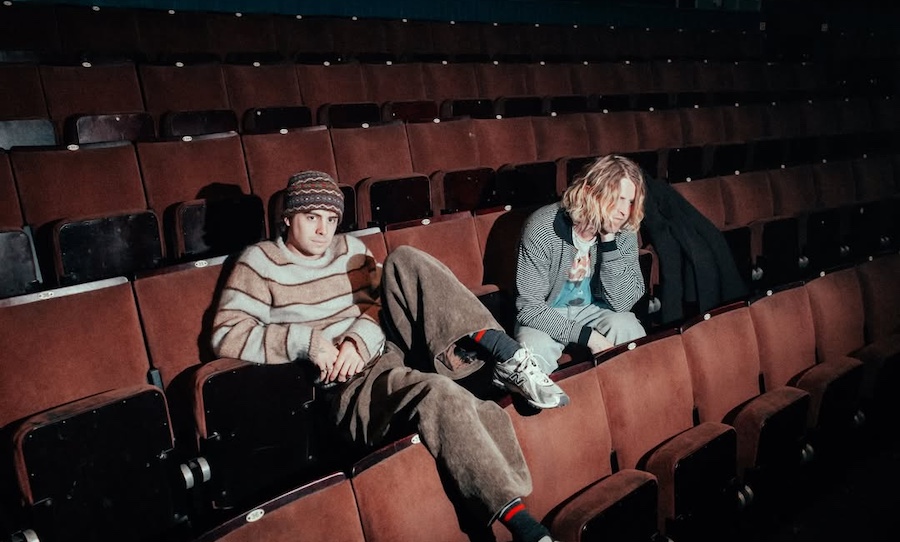Bob Moses sound a little different in their wildly poignant new album.
Bob Moses have recently celebrated the release of their highly anticipated album The Silence in Between and the huge full-length record shows a more vulnerable side.
Bob Moses’ Tom Howie and Jimmy Vallance spent their lockdown working on the album while the world around them was crumbling. The pair experienced an immense amount of loss and change that brought them to a point of leaning on each other and creating something beautiful.
Although the album is littered with the expected moody tracks here and there, it is not without its life-affirming anthems. We caught up with Tom and Jimmy to discuss the stylistic shift.
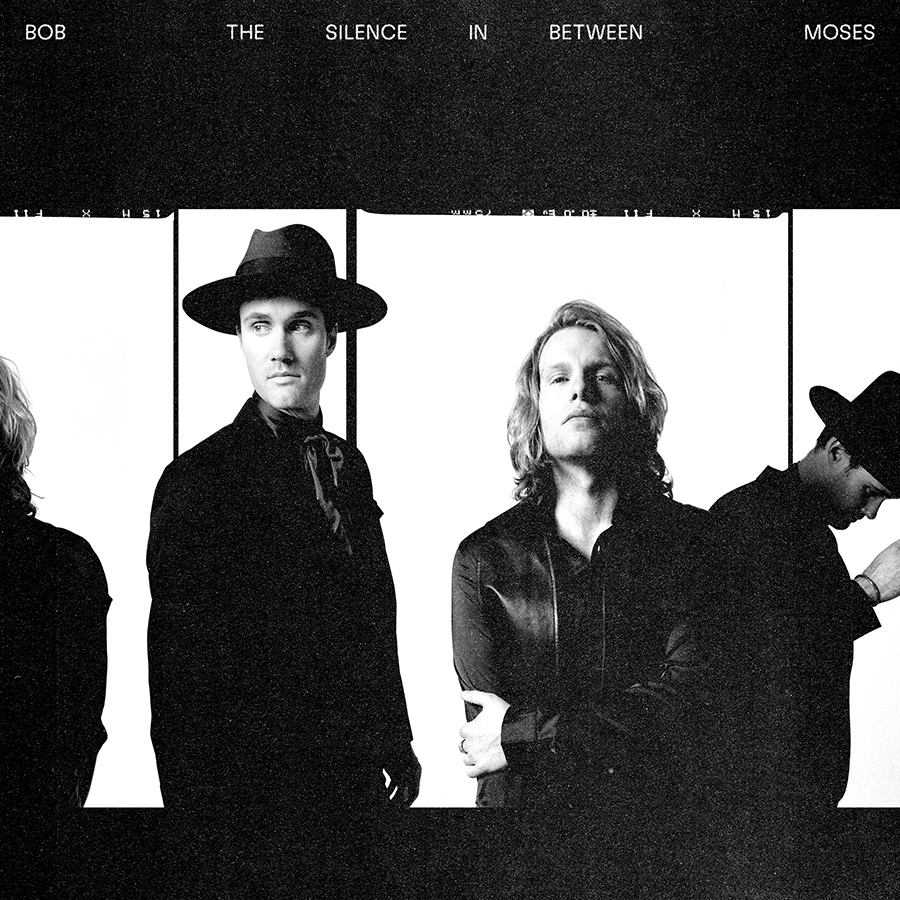
HAPPY: Hey, guys, how are you doing?
TOM: Good, how are you?
HAPPY: Good, thank you. What’s going on today?
TOM: Just rehearsing, you know, getting ready for… we have one week of production rehearsals left before our tour starts. So, the mad dash to make sure it all works.
HAPPY: Yeah, that’s huge. Well, congratulations on your album release. I’m a big fan. I think we spoke with you about four years ago. We did an interview with you guys. Strangely, I don’t think we ever asked you about the name Bob Moses. Where does the name come from?
JIMMY: We were named Bob Moses by our… we used to be on a small independent label called Scissor and Thread. We started out in New York, and the owner of that label, Francis Harris, named us Bob Moses, and we had no idea what it meant and then realised there was a New York City planner, a famous jazz drummer, a civil rights activist. And so we just liked that it was kind of like this random name. There’s a band in Canada called Billy Talent that is like a person’s name or like Alice Cooper or Jethro Tull.
And we like this idea of like two people, one name. At the time, we were super into this mysterious deep house scene in New York. So it felt nice to add a sort of air of mystery to it all. And we used to, every interview sort of change what the name… like we used to say, it was like our gym teacher. We used to say it was a famous hairstylist from the seventies, so the name doesn’t really mean anything. But I think the reason that we stuck with it was our first studio space in the depths of Brooklyn in New York, we had to take the Bob Moses Expressway to get there. And so we just thought it kind of was like, you know, cool. We don’t have any better names, so let’s stick with it.
HAPPY: I love that. That’s awesome. So you mentioned that you used to be way more mysterious. Now you guys, you’ve obviously got your faces kind of all over the press gear and everything. What’s it like performing, I guess, having a bit more transparency to your identity?
TOM: It’s great. I think that like probably performing has helped that to come out because performing you can’t… I mean, we’ve always just been two dudes on stage or two of a few dudes on stage. We’ve never hidden our faces performing. So that’s kind of helped us, I think, come out a little bit in terms of showing ourselves in marketing and stuff.
But I think that also we’re getting a bit, you know, more secure in our music and more secure in ourselves and more secure in our sound and I think that this album is our most honest yet, and it felt really kind of felt like the right thing to kind of stop hiding behind dance music cool as much and just kind of be a bit more emotionally transparent and like show our faces and be like, ‘Hey, this is us, and this is what we’re about.’ And so that’s kind of where this impulse to sort of put ourselves out there a bit more has come from, and I think also the fact of the album… like because the album was made in this period where sort of our identities around being two guys and Bob Moses, or being two touring musicians or being whatever sort of sense of identity we had about being public-facing musicians was basically entirely stripped away because obviously we couldn’t do anything or go out of the house for two years.
And so that really helped us to sort of… it forced us to look inside and to sort of process and deal with a bunch of personal stuff and be really honest about who we are and like what we’re going through. And that has made it out onto this record in the subject matter. But it’s also inspired us to kind of be like, ‘OK, well. This is where we’re talking from now, we’re talking from this point of like who we really are as people’, and it’s a very honest place, so it makes sense to show our faces and not hide behind anything, you know?
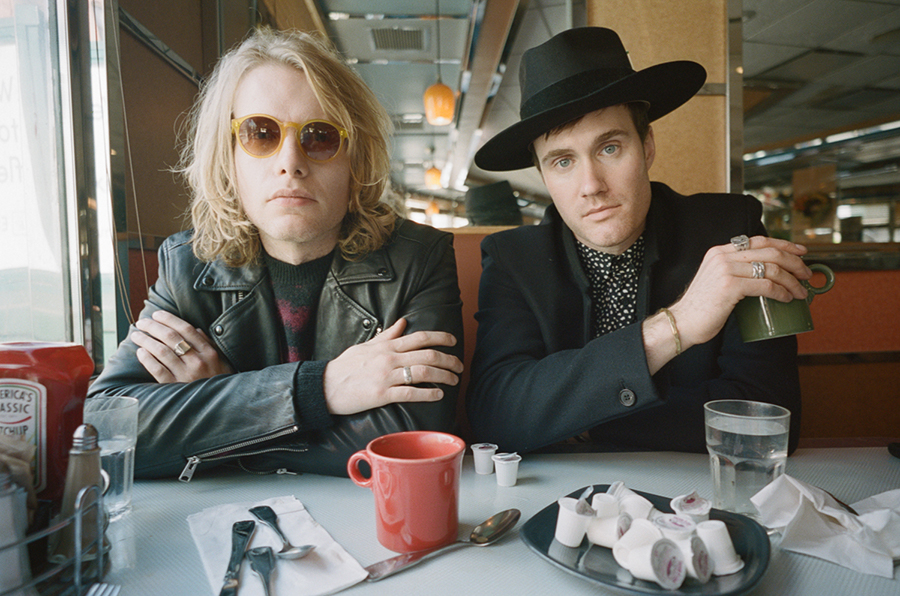
HAPPY: Oh yeah. totally. I mean, I think that that is so clear, like the transparency in the album. It’s had this big shift, especially compared to your much earlier work. You know, even just lyrically. I wouldn’t… you know, you guys are described as this electronic duo. I’m like, there is so much more to it than just the electronic stuff. Obviously, it’s electronic, but there’s this kind of… I know you’ve got your influences as well, like rock and all of these things, but it’s actually quite poppy. And I don’t want that to be an insult… I mean, I love pop, but it’s so vulnerable and open and emotional, it’s really, really cool. Yeah, I guess would you guys still put yourself in that same electronic box or would you just agree that there’s so much more influencing you now?
JIMMY: I think we definitely have a foot in that box, but I think like you said, it’s like now we’ve definitely… you know, especially the last record Battlelines, we’ve kind of stepped out of the box a bit, but still have a foot in it, you know. And I think we’re extremely fortunate that we still are able to play a lot of the clubs with a lot of acts that are in that world because that’s a very hard world to get into if you’re not from it. So we’re very fortunate to be from there. But we’re also happy to be able to go and play concerts and have shows and do something that typical DJs or electronic acts wouldn’t do. And you know, I think it’s funny like that that your hesitancy to call it pop was something that we really had conversations about while we were writing the record. Like, Tom and I love pop music, and I think we’re super happy to see that pop music has become a lot less homogenous over the last couple of years. And with artists like Billie Eilish coming up and Olivia Rodrigo and you know, there are so many acts that it doesn’t all sound the same anymore.
It’s different. You have rock doing well, you have hip hop influenced stuff doing well, you have dance-influenced stuff, songs, instrumental. It’s all over the place, which is a much more exciting place for pop music to be than everything just sounding like cookie-cutter, everything sounds the same. So I think we’re very happy now to have that pop stamp because like we were influenced by pop music while making this record, not only modern pop music but pop music of the eighties and nineties. So I think we just wrote the songs that when we were stuck during the pandemic and couldn’t go anywhere, this is almost like sort of… calling it a guilty pleasure record isn’t the right word, but it just felt like now’s the time. Like we have it in us. Let’s just not hold back and have fun, you know?
HAPPY: Totally. That rules. I think that’s so… it just makes it so nice to listen to. Everything’s been great to listen to, but the more you’re having fun, obviously, the better it’s going to sound. OK, on the performance side of things, you guys did a live Twitch stream for the album release. Is that right?
TOM: Yeah.
HAPPY: How was that?
TOM: It was great. I mean, we’d done a few things over the pandemic streaming on Twitch. Just sort of doing DJ sets from our studio. We did a couple like, let’s make a beat on Zoom sort of thing. And we did a bunch of that. And that was kind of a really nice way for us to connect with our audience in some way, you know, when we were starved for that. There’s something very visceral about going out every weekend and playing shows, and there’s that energy that you get that really feeds you in a certain way, and when we didn’t have that at all, we kind of tried our best to get some sense of it, at least through Twitch streaming and stuff like that. But so we kind of developed a partnership with Amazon and Twitch through that, through experimenting with that over the pandemic and then for the release of the record we decided to do… we wanted to do a sort of release party, and then Amazon came out as this really great partner to do the streaming of it and kind of film it and capture some of it in a really cool way.
So it was fun. We had like this crazy… we did it on a rooftop in Hollywood, really close to the Capitol Records building, which is kind of like an iconic thing. And we had this huge draped tapestry that our creative director sort of helped design. And it looked really awesome. And we were kind of nervous because we hadn’t played live with the band in about two years. And some of the songs were really new, you know, like we were just like, ‘Oh, I hope we don’t screw it up.’ But it was really fun, and it felt really good to get out in front of a live audience and play with the band. And yeah, it was great.
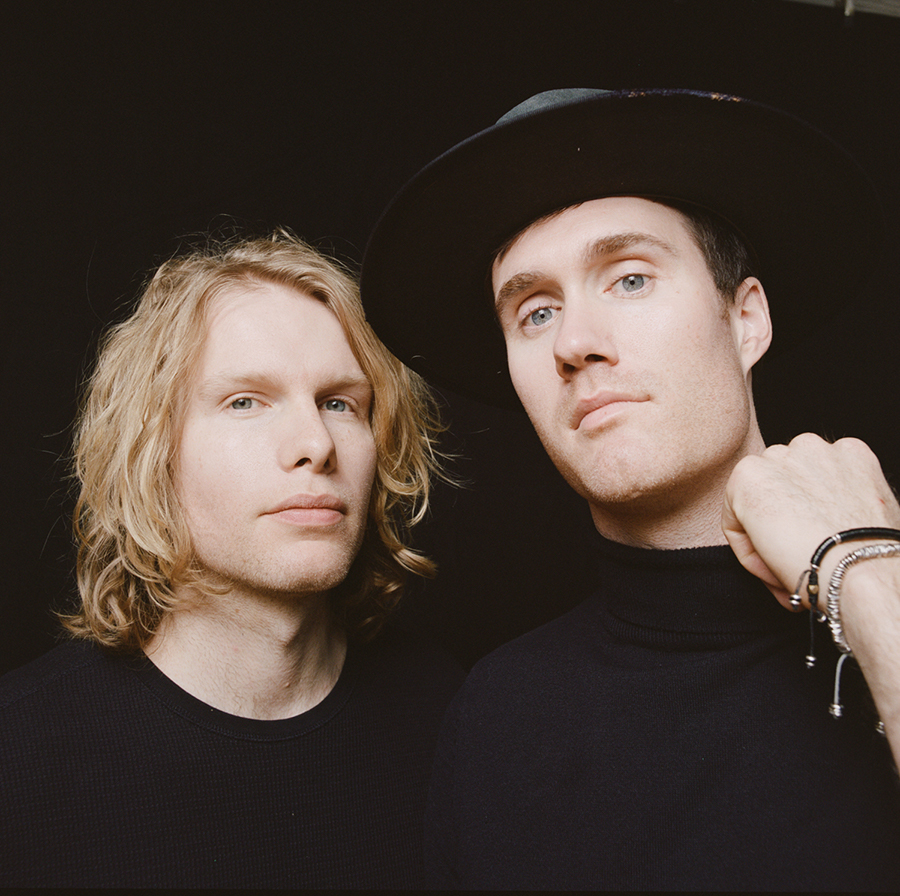
HAPPY: Excellent. Do you guys live together or close by?
JIMMY: Yeah, we live about 20 minutes away from each other in Los Angeles.
HAPPY: Great, OK. How was the lockdown for you then? Did you get to kind of see each other at a distance and overall, how did you cope?
JIMMY: We spent every day together basically. Like we were… I mean, fortunately, like Los Angeles allowed you to sort of have like a bubble of a small group of people. And so, you know, in the beginning, it was like rough going. I remember like ordering our groceries in, but like Tom would come over and, you know, they’d work every day and just… there was a lot of anxiety, definitely, because we didn’t know if we were going to be able to tour again if we were going to… what was going to happen to our careers. Like we’d worked to a point where we have a very comfortable and awesome live business going and like everything was gone. You know, some of our crew, like our tour manager Yasmin, she’s actually from New Zealand. So she went back to New Zealand to live there for the first time in ages. And so it all felt very yikes, you know?
But all of that poured into the music, and ultimately we realised we were sort of like, you know, writing songs to cheer ourselves songs up, like hanging on. It’s literally about watching sort of like, you know, during the protests, like watching the world sort of burn around us. Everyone having differing viewpoints kind of being like, ‘what the hell is going on?’ And kind of just, writing like we have to get through this, not only for us but for society as a whole. So we were kind of writing music to cheer ourselves up. And not only that but just like a retrospective on what was going on around us as a way to kind of cope with it and understand so having each other and being able to hang out with each other and write music, which is our favourite thing to do on the planet, was actually… it made for an amazing lockdown experience, you know? In hindsight, it was very stressful at the time, but looking back, it was a great thing.
HAPPY: Of course. That’s really good. I’m glad you had each other. I have a silly question. I guess I want to know if you guys have any musical opinions that divide you. Or do you get along completely?
TOM: I mean, we like a lot of the same stuff, we like most of the same stuff. I think, there’s like the odd pop song that like Jimmy will like that I don’t like and I’ll like another pop song that he doesn’t like it or he likes… you know, like, we both like metal. But JIMMY likes really some hardcore metal that is too… when there’s too much of the screaming and the super horror movie lyrics, I’m just like, ‘I can’t do it’, you know? Whereas Jimmy is kind of into some of that stuff. So there are certain things, like little deviations, but for the most part, we basically like 99 per cent of the same stuff.
HAPPY: Ok. Alright. So, there’s no artist that one of you would die on a hill to say, ‘No, you’re wrong’?
JIMMY: Oh, no, I don’t think… probably, but like, not off the top… Like, we’ve had some… I remember one time we got in this argument on the bus, but Tom and I were both on the same page here. We were touring with an opening act named John Green, who’s a great DJ, and we got in this debate like whether or not Audioslave was good or not. And Tom and I love Audioslave, and he was like, ‘No, Soundgarden and Rage Against the Machine are so much better!’ And we were like, ‘We also love those bands, but we also like Audioslave’, and they were like, ‘No, I can’t. I cannot have this.’ So Tom and I have never gotten into that with each other on those things. We’re usually in the same boat, you know?
HAPPY: Yeah, that’s great. Some people just don’t accept that you can like other music if you like one band. I love that. Well, I think that’s all from me today. I really appreciate you guys speaking with me.
TOM: Of course. Really nice to chat with you. Chloe, thanks for taking the time.
HAPPY: No, of course. Thank you for the music. It’s such a fantastic album. I cannot congratulate you enough.
TOM: Thank you.
JIMMY: Thank you.
The Silence in Between is out now.
Photos Supplied
Interview by Chloe Maddren
